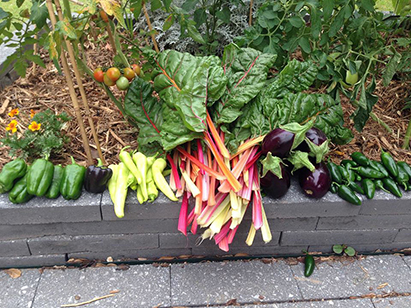Horticulture Honors Student Discovers Why Small Farmers Continue to Farm
FAYETTEVILLE, Ark. – Fayetteville is home to one of Arkansas' largest farmers markets and boasts fresh, locally grown produce. Customers have a variety of reasons for grocery shopping on the downtown Fayetteville Square — and the farmers have their own list of reasons for selling locally.
Megan Lankford is an Honors College student majoring in horticulture, landscape and turf sciences in the Dale Bumpers College of Agricultural, Food and Life Sciences at the University of Arkansas. She conducted a case study by interviewing five of the 70 vendors from the Fayetteville Farmers Market to discover why small farmers farm and sell at the local level. She drew on personal experience in forming some questions.
“My grandfather was a dairy farmer, and farming has always been an interest to me and part of who I am, so I started looking at different statistics about farms,” said Lankford, who grew up in Oxford, New York. “What really struck me and got me interested was that most of the small farmers either break even or actually lose money farming.”
After completing the interviews, Lankford was able to identify 12 major themes to help answer her question. One of the strongest commonalities among the families is that farming is a way of life and all farmers interviewed had jobs off the farm to help support their passion.
“I think the most shocking thing is that they work full time and then they come home and farm,” said Lankford. “I think for most of them it is because it is part of who they are or they grew up that way.”
Lankford also found the main reason they sell at the farmers market is to connect with the people buying their products.
“Most of them sell at the farmers market because they really enjoy knowing their customers,” said Lankford. “They get to build great relationships with people they wouldn't otherwise if they were to sell at a regional or national level.”
Lankford's adviser, Kate Shoulders, an assistant professor of agricultural education, communications and technology, said having a connection with the farmer is one of the many reasons consumers chose to shop at farmers markets.
“The thing is, consumers like to be connected,” said Shoulders. “They like to build relationships with the farmers.”
The vendors Lankford interviewed also commented on how competitive the Fayetteville Farmers Market is and how they need to produce a wide variety of vegetables and fruits, said Lankford.
“Most of them produce a huge variety of vegetables and some do fruits,” said Lankford. “They grow everything from brassica – which is like broccoli – mustard greens, kale, tomatoes, peppers, apples, peaches, eggs and just about anything else you could produce in a small-scale agricultural setting.”
Lankford is currently working with the families to use their stories to connect them with costumers they may not have met.
“Megan is working on trying to find ways to tell those stories to the consumers so that it does not take you six months of working with a farmer to get to know them a little, but you can feel that connection as soon as you get to the farmers market,” said Shoulders.
Lankford hopes to build a public awareness campaign from the case study for her sustainability minor capstone project.
“If each of us spent a small amount of our grocery budget at the farmers market or buying local, it would make a huge difference,” said Lankford.
About the Dale Bumpers College of Agricultural, Food and Life Sciences: Bumpers College provides life-changing opportunities to position and prepare graduates who will be leaders in the businesses associated with foods, family, the environment, agriculture, sustainability and human quality of life; and who will be first-choice candidates of employers looking for leaders, innovators, policy makers and entrepreneurs. The college is named for Dale Bumpers, former Arkansas governor and longtime U.S. senator who made the state prominent in national and international agriculture.
About the University of Arkansas: The University of Arkansas provides an internationally competitive education for undergraduate and graduate students in more than 200 academic programs. The university contributes new knowledge, economic development, basic and applied research, and creative activity while also providing service to academic and professional disciplines. The Carnegie Foundation classifies the University of Arkansas among only 2 percent of universities in America that have the highest level of research activity. U.S. News & World Report ranks the University of Arkansas among its top American public research universities. Founded in 1871, the University of Arkansas comprises 10 colleges and schools and maintains a low student-to-faculty ratio that promotes personal attention and close mentoring.
Contacts
Brittney Fund, communications intern
Bumpers College of Agricultural, Food and Life Sciences
559-978-1262,
bfund@uark.edu
Headlines
U of A's Inspirational Chorale Makes Its Carnegie Hall Debut
The U of A's Inspirational Chorale took center stage at Carnegie Hall in March, performing under the direction of professor Jeffrey Murdock to a packed audience at the iconic Stern Auditorium.
The State of Economics With Mervin Jebaraj Set for June 5
U of A economist Mervin Jebaraj will analyze state's economic trends and regional issues in an upcoming talk. Preregistration is required by May 31.
Faculty Demonstrate Dedication to Student Success Through Teaching Credentials
Eight faculty members from across the U of A have earned the prestigious Association of College and University Educators certification in Effective College Teaching.
Artificial Intelligence, Machine Learning Boost Arkansas Animal Science Research
Aranyak Goswami, a bioinformatics specialist, will work with three different departments to boost the research arm of the U of A System Division of Agriculture.
College of Education and Health Professions Doctoral Student Picked for Grosvenor Fellowship
Jessica Culver, a doctoral student in the College of Education and Health Professions Adult and Lifelong Learning program, has been selected as a member of the 2024 Grosvenor Teacher Fellowship.





